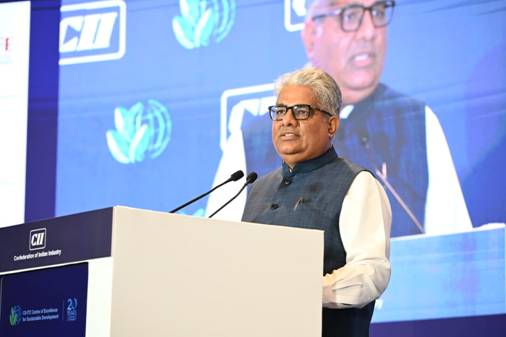Union Environment Minister Bhupender Yadav on Tuesday said India’s growth model seeks to strike a balance between economic progress and ecological stewardship, stressing that sustainability should be seen as a lifestyle choice rather than a distant goal.
Addressing the 20th Global Sustainability Summit in Delhi organised by the CII-ITC Centre of Excellence for Sustainable Development, Yadav said India has emerged as the fastest-growing major economy while also taking the lead in climate action.
“By embracing resilience, regeneration and responsibility, let us chart a course towards a more sustainable world,” he said, calling upon industry and global stakeholders to weave sustainability into corporate policies in line with national aspirations.
The minister highlighted a series of recent policy initiatives, including the notification of Environment Audit Rules, 2025, aimed at establishing a two-tier auditing system and a dedicated agency for transparent monitoring. He said these rules would supplement, not replace, the government’s existing inspection framework.
Yadav also pointed to the revised methodology for the Green Credit Programme, allowing direct participation by private entities and setting minimum eco-restoration commitments to mobilise private capital for climate action.
The ministry recently amended the Forest (Conservation and Augmentation) Rules, 2023 to streamline approvals for critical mineral mining in forest areas under the National Critical Mineral Mission, launched this year. The mission identifies 24 minerals as critical and strategic, and 29 others as important for the economy and national security.
The minister said India has consistently overachieved its climate targets under the Paris Agreement, expanding renewable energy capacity, promoting corporate accountability through ESG (environmental, social and governance) norms, and strengthening circular economy practices.
He also announced that India would soon roll out its National Adaptation Plan (NAP), a science-led framework to embed climate adaptation into national policies across sectors, with the objective of reducing vulnerabilities to climate-related risks.
Referring to India’s campaigns such as Mission LiFE and Ek Ped Maa Ke Naam, Yadav said expanding forest cover and enhancing carbon sinks were critical parts of the country’s sustainability roadmap.
Yadav added that India’s integrated approach could serve as a valuable model for the Global South and provide lessons for developed economies facing growth stagnation.
The two-day summit, attended by delegates from more than 10 countries and industry leaders, is expected to deliberate on transformative pathways for inclusive and sustainable growth.














